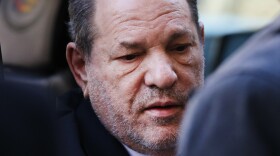
Ted Robbins
As supervising editor for Arts and Culture at NPR based at NPR West in Culver City, Ted Robbins plans coverage across NPR shows and online, focusing on TV at a time when there's never been so much content. He thinks "arts and culture" encompasses a lot of human creativity — from traditional museum offerings to popular culture, and out-of-the-way people and events.
Robbins also supervises obituaries or, as NPR prefers to call them, "appreciations," of people in the arts.
Robbins joined the Arts Desk in 2015, after a decade on air as a NPR National Desk correspondent based in Tucson, Arizona. From there, he covered the Southwest, including Arizona, New Mexico, and Nevada.
Robbins reported on a range of issues, from immigration and border security to water issues and wildfires. He covered the economy in the West with an emphasis on the housing market and Las Vegas development. He reported on the January 2011 shooting in Tucson that killed six and injured many, including Arizona Congresswoman Gabrielle Giffords.
Robbins' reporting has been honored with numerous accolades, including two Emmy Awards—one for his story on sex education in schools, and another for his series on women in the workforce. He received a CINE Golden Eagle for a 1995 documentary on Mexican agriculture called "Tomatoes for the North."
In 2006, Robbins wrote an article for the Nieman Reports at Harvard about journalism and immigration. He was chosen for a 2009 French-American Foundation Fellowship focused on comparing European and U.S. immigration issues.
Raised in Los Angeles, Robbins became an avid NPR listener while spending hours driving (or stopped in traffic) on congested freeways. He is delighted to now be covering stories for his favorite news source.
Prior to coming to NPR in 2004, Robbins spent five years as a regular contributor to The News Hour with Jim Lehrer, 15 years at the PBS affiliate in Tucson, and working as a field producer for CBS News. He worked for NBC affiliates in Tucson and Salt Lake City, where he also did some radio reporting and print reporting for USA Today.
Robbins earned his Bachelor of Arts in psychology and his master's degree in journalism, both from the University of California at Berkeley. He taught journalism at the University of Arizona for a decade.
-
Former movie producer Harvey Weinstein now faces 11 sex crime charges in Los Angeles, following new charges Friday. He is currently serving a 23 year sentence in New York.
-
The singer crafted a distinctive career that spanned decades and styles. Though a leading figure in her field, Norman's repertoire, fanbase and achievements stretched far beyond the opera house.
-
Los Algodones is tiny, but with help from the Internet, the Mexican border town has become a virtual dental factory, drawing patients from across the U.S. and Canada.
-
A Wild West-style dispute between a Nevada rancher and the Bureau of Land Management has subsided — at least for the moment. Saying Cliven Bundy owed substantial back fees for allowing cattle to graze on federal land, the BLM had begun rounding up his cattle. But following protests from Bundy and hundreds of others, some armed, the BLM backed down, for now.
-
The Albuquerque Police Department has engaged in excessive force and unreasonable deadly force, according to a civil rights investigation by the Department of Justice.
-
Thanks to an agreement between the U.S. and Mexico, water is flowing to 35 million people in both countries along the Colorado River Delta. At least for now.
-
Residents of a small town in southern Arizona say a local Border Patrol checkpoint is unnecessary and that agents have overstepped legal bounds. So now they conduct their own form of surveillance.
-
The U.S. Border Patrol announced changes to its policies regarding use of deadly force on Friday. It added new guidance for agents when dealing with moving vehicles and people throwing rocks.
-
Opposition in Arizona is growing against a controversial bill that would let business owners to refuse service based on religious beliefs. Gov. Jan Brewer hasn't yet decided whether to veto the bill.
-
Air bags stored in backpacks are saving the lives of backcountry skiers, snowboarders and snowmobilers. They look something like car air bags, but they work on an entirely different principle. These keep you safe simply by turning you into a larger object, and that helps you rise to the top of debris.




